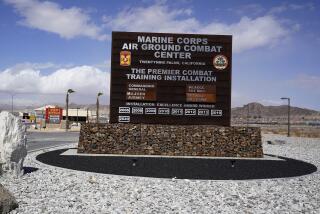Up to Speed : Use of Drugs Increasing at Desert Marine Corps Base, Officials Say
- Share via
TWENTYNINE PALMS — Methamphetamine use, a growing practice recently among Marines stationed here, is now the base’s most widespread illegal drug problem, military officials say.
The Air Ground Combat Center, a training base for about 9,000 Marines, is in the high desert about 100 miles east of San Bernardino, an area authorities say is a center for illegal methamphetamine labs because of its isolation and sparse population.
“There’s so much of the drug in the area you have to figure it’s going to eventually impact the base,” said 1st Lt. James Western, who heads the base’s drug and alcohol counseling center. “On East Coast bases, crack is the big problem, but out here the problem is ‘meth.’ ”
Last month, 10 Marines tested positive for methamphetamine use on random urinalysis tests, base officials said. And, according to the Naval Investigative Service, about 20 Marines at Twentynine Palms have been arrested in the last two years for distributing the drug.
But Marines on base say those caught represent only a fraction of users.
“You see guys dragging in on Monday, wasted, saying they haven’t slept or ate the whole weekend,” said one Marine, who requested anonymity. “It makes you real nervous when you’re out on a night fire with guys like that and they’re shooting off missiles.”
Deputies Break Up Ring
Three weeks ago, San Bernardino County sheriff’s deputies broke up a methamphetamine ring near Twentynine Palms and arrested 35 people who had been selling the drug. Although no one from the base was arrested, a number of Marines had made purchases from the dealers.
“We found out that some of the dealers were selling regularly to Marines,” said Larry Bowman, a senior deputy in the sheriff’s narcotics unit.
The Marine Corps will not release statistics on the number of Marines who have been discharged because of drug use. But base officials have recognized that methamphetamine, or speed, use is a major problem and they have “told our department to address it,” Western said.
Random urinalysis testing is more frequent now, he said, including occasional “unit sweeps,” where entire battalions are tested. Drug awareness classes are mandatory for both officers and noncommissioned officers. And, Western said, base leaders have allocated more resources for drug treatment and enforcement.
The base offers counseling and an outpatient treatment program. Marines with more serious drug problems are sent to the drug-treatment center at the Miramar Naval Air Station in San Diego.
Those who voluntarily seek treatment generally are not prosecuted, Western said. But Marines found using drugs “often are discharged or court-martialed,” he said. “They have to have extraordinary potential . . . to be allowed to stay in.”
More to Read
Sign up for Essential California
The most important California stories and recommendations in your inbox every morning.
You may occasionally receive promotional content from the Los Angeles Times.













